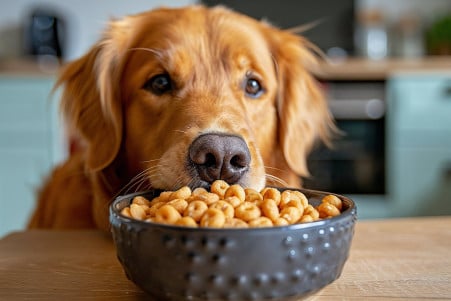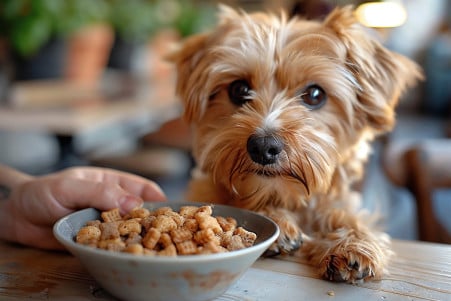Can Dogs Eat Honey Nut Cheerios? What a Vet Says About Healthy Treats
8 February 2024 • Updated 8 February 2024

While you may enjoy Honey Nut Cheerios for breakfast, can your dog partake in the same snack? Dogs can eat Honey Nut Cheerios in moderation as a treat but not as a meal replacement. Be careful with portion sizes because the sugar in Honey Nut Cheerios can be harmful to dogs. Always ask your vet before adding anything new to your dog’s diet.
In this article, we’ll take a deep dive into the question of whether or not dogs can eat Honey Nut Cheerios, looking at a variety of veterinary opinions and nutritional facts. We’ll also look at the ingredients in Honey Nut Cheerios, including honey and nuts, and how they affect dogs.
Finally, we’ll discuss the bigger picture of feeding dogs human cereal. By the end, you’ll know exactly what treats are healthy and safe for your dog to eat.
Can dogs eat Honey Nut Cheerios?
Honey Nut Cheerios Ingredients and Dog Nutrition
Honey Nut Cheerios is a popular cereal that many people have in their pantry. It is made with whole grain oats, and according to General Mills, the cereal’s main ingredient is whole grain oats, which is combined with sugar, honey, and natural almond flavor to make the cereal taste sweet. While people can enjoy the 12 essential vitamins and minerals and the fact that it’s gluten-free, these things mean something completely different for dogs.
The nutritional value of Honey Nut Cheerios for dogs is a little more complicated. While dogs can eat the non-toxic cereal in small amounts as a treat, the high sugar content is a problem, according to Therapy Pets Unlimited. This can lead to the same issues in dogs that it does in people, including obesity and dental problems.
Honey Nut Cheerios is marketed as part of a heart-healthy diet for people, and the cereal’s soluble fiber is said to help lower cholesterol. However, when it comes to giving it to dogs as a treat, it’s important to note that the sugar and almond content may not be in line with a dog’s nutritional needs.
While honey can help boost the immune system, it’s important to weigh this against the potential harm of giving dogs too much sugar.
As with anything, when it comes to giving dogs treats, it’s important to do so in moderation and to consider the potential health risks.
The Bitter Truth: How Sugar Affects Dogs
The use of sugar in dog food is a topic of debate, but studies show that dogs can suffer from several negative health effects due to sugar consumption. While sugar is not poisonous to dogs in small amounts, regular consumption can lead to obesity, metabolic changes, dental issues, diabetes, and even pancreatitis, according to PetMD.
All of these issues could be caused by the brown sugar syrup in Honey Nut Cheerios and other sugary cereals if dogs eat them regularly.
This also plays into the ongoing debate about grain-free diets. Since Honey Nut Cheerios are grain-based, they go against the grain-free philosophy that says dogs don’t need carbs in their diet. However, Hepper notes that while dairy products like milk can be an issue for dogs that are lactose intolerant, grains aren’t a problem in moderation and can even be helpful.
Sugar should make up less than 10% of a dog’s diet when it comes to treats. Holiday Barn’s blog stresses the importance of choosing treats wisely and suggests natural sugars found in fruits and vegetables over refined sugars.
For those who are thinking about giving their dog Honey Nut Cheerios as a treat, it’s important to do so in moderation and keep a close eye on their dog’s overall sugar intake to make sure it doesn’t become a problem in the long run.
Honey in Dog Diets
Honey’s natural healing properties aren’t just limited to humans. Honey has been shown to have medicinal properties in animals as well.
A scoping review published in PubMed by Nadine A. Vogt looked at the evidence for the medicinal use of natural honey in animals. The review found that honey had potential in wound healing and in the treatment of a variety of conditions, including metabolic diseases such as diabetes.
The American Kennel Club (AKC) says that honey is safe for dogs in small amounts and that it provides some vitamins and minerals. However, dog owners need to be careful because of honey’s sugar content and the potential for botulism spores in raw honey, which can be dangerous for puppies or dogs with weak immune systems.
As for Honey Nut Cheerios, the honey in the cereal may have some small benefits. However, the need for moderation should not be forgotten because of the presence of honey, especially since the cereal is high in sugar.
For dogs with conditions like atopic dermatitis, honey may be helpful. This is consistent with the results of studies that have looked at the oral administration of honey.
However, dog owners need to weigh these considerations and remember that while Honey Nut Cheerios can be part of a dog’s diet in small amounts, they should not be a substitute for a well-balanced canine diet.
Almond Flavoring: Risk to Dogs
When it comes to the safety of dogs, it’s important to distinguish between natural almond flavoring and whole almonds. The American Kennel Club explains that while almonds are not toxic to dogs, they can cause issues like gastrointestinal upset, obesity, and pancreatitis. In addition, the shape and size of almonds can be a choking hazard, especially for smaller dogs, and can cause blockages that require surgery.
On the other hand, the natural almond flavoring in Honey Nut Cheerios does not pose the same risks as the nut itself. According to Easy Dog Food Recipes, almond extract, which is commonly used as a flavoring, is made from the essence of almonds without the physical components that can cause gastrointestinal upset or blockages.
That said, dog owners should still be cautious because flavorings can be made up of different ingredients and can include other substances that are toxic in large quantities.
If a dog eats whole almonds, owners should be on the lookout for signs of gastrointestinal upset or blockages. When it comes to almond-flavored products like Honey Nut Cheerios, it’s important to make sure that dogs are only eating them in moderation to avoid potential problems from other ingredients.
If your dog eats a large number of almonds or seems to be having a reaction to eating Honey Nut Cheerios, make sure to get in touch with your vet right away. With this information in mind, dog owners can feel more confident in making decisions about occasional treats like Honey Nut Cheerios.
Everything in Moderation: Using Honey Nut Cheerios as a Dog Treat
If you’re thinking about using Honey Nut Cheerios as a dog treat, the biggest thing to keep in mind is portion control. According to A-Z Animals, no more than 10% of a dog’s daily caloric intake should come from treats.
In general, a small amount of this cereal can be a low-calorie treat option, especially for dogs who are on a diet. It’s important to note that while Honey Nut Cheerios aren’t toxic, they aren’t necessary for a dog’s diet and should be used as a special treat instead of a regular part of their meals.
When you’re introducing a new treat like Honey Nut Cheerios to your dog, make sure you do it slowly. Therapy Pets Unlimited recommends giving your dog a small amount and watching for any changes in behavior, then talking to your vet about the best way to incorporate the treat into your dog’s diet.
You should also watch for signs of an allergic reaction, which can include itching, digestive issues, or ear infections. If you notice any of these symptoms, make sure to stop giving your dog the treat and talk to your vet.
As with all treats, the most important thing to remember when giving your dog Honey Nut Cheerios—or any other new treat—is to use them in moderation and make sure you’re considering your dog’s health and diet.
Conclusion: How to Best Feed Your Dog Cheerios
In conclusion, Therapy Pets Unlimited says that dogs can have Honey Nut Cheerios as long as they are given in moderation. The cereal’s grain base and a little bit of honey are safe for dogs, but the sugar and other flavorings, like chocolate or nuts (which are toxic to dogs according to A-Z Animals), mean that you should be careful.
Dogs can have Honey Nut Cheerios as long as they are given in moderation and make up no more than 10% of their diet, according to Hepper.
As responsible pet parents, we have to find a way to spoil our dogs while also making sure that we are keeping them as healthy as possible. The best way to do this is to make sure that you are feeding them in moderation and that you are also talking to your vet.
This way, you can make sure that you are giving your dog treats like Honey Nut Cheerios in a way that is part of a healthy, balanced diet that is tailored to their specific needs.
Think of treats as something that you are adding to a healthy diet, not something that you are taking away from it. If you do this, you can give your dog Honey Nut Cheerios as a small way to show them that you love them without worrying about their health.


